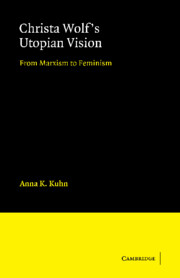Book contents
- Frontmatter
- Contents
- Acknowledgments
- List of abbreviations
- 1 Introduction: setting the context
- 2 Beginnings: experimentation with Socialist Realist paradigms
- 3 Christa T.: the quest for self-actualization
- 4 Patterns of Childhood: the confrontation with the self
- 5 No Place on Earth: revision of the Romantic heritage
- 6 Cassandra: myth, matriarchy, and the canon
- 7 In lieu of a conclusion. Störfall: the destruction of utopia?
- Notes
- Bibliography
- Index
1 - Introduction: setting the context
Published online by Cambridge University Press: 18 September 2009
- Frontmatter
- Contents
- Acknowledgments
- List of abbreviations
- 1 Introduction: setting the context
- 2 Beginnings: experimentation with Socialist Realist paradigms
- 3 Christa T.: the quest for self-actualization
- 4 Patterns of Childhood: the confrontation with the self
- 5 No Place on Earth: revision of the Romantic heritage
- 6 Cassandra: myth, matriarchy, and the canon
- 7 In lieu of a conclusion. Störfall: the destruction of utopia?
- Notes
- Bibliography
- Index
Summary
In the twenty-six years since her emergence as a writer of imaginative literature, Christa Wolf has become one of the leading figures of German letters and the foremost female voice of the German-speaking world. Inherently political, her writing is both subtle and subversive. As she has matured, her themes have become more complex and the problems she addresses broader. The increasing universality of her writing, the immediacy and compelling relevance of her most recent works have helped earn her the international reputation she enjoys today. The East German writer of the early 1960s has evolved into a writer of world stature in the eighties. Abandoning the Socialist Realism that had influenced her early works, Moscow Novella (1961) and The Divided Heaven (1963), Christa Wolf established a distinctive style and set of concerns with The Quest for Christa T. (1968) and Patterns of Childhood (1976).
These novels were at first severely criticized in the German Democratic Republic (GDR) both for their complex experimental form and for their unorthodox subject matter. Christa T.'s claim to the right of individual self-fulfillment within the socialist collective and the narrator's need in Patterns of Childhood to come to terms with her Nazi past (from which the GDR totally dissociated itself) were considered taboo subjects. In the interim, the reception of Christa T. has changed radically – today the book is viewed as a classic, aimed at strengthening the socialist state through internal criticism.
- Type
- Chapter
- Information
- Christa Wolf's Utopian VisionFrom Marxism to Feminism, pp. 1 - 19Publisher: Cambridge University PressPrint publication year: 1988



